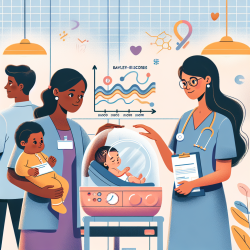In the field of speech-language pathology, data-driven decisions are paramount in creating impactful outcomes for children. One recent study, "A Severity Comparison between Italian and Israeli Rett Syndrome Cohorts," offers valuable insights that can help practitioners enhance their skills and encourage further research.
Rett syndrome (RTT) is a neurodevelopmental disorder characterized by severe cognitive, communication, and motor impairments. Despite genetic similarities, the severity of RTT symptoms can vary widely among individuals. This study compared the severity of RTT in Italian and Israeli cohorts, highlighting how different cultural and environmental factors influence the development of individuals with RTT.
Key Findings
- Italian participants, both young and older, generally showed better scores in motor and disease-related characteristics compared to their Israeli counterparts.
- Young Italian participants had better emotional and behavioral scores and lower incidences of scoliosis, foot problems, and epilepsy.
- The inclusive educational model in Italy, which integrates children with RTT into mainstream schools, may contribute to these better outcomes.
Implications for Practitioners
These findings underscore the importance of an inclusive, active, and socially enriched environment for children with RTT. Practitioners can draw several actionable insights from this study:
- Encourage Inclusion: Advocate for inclusive educational settings that allow children with RTT to interact with typically developing peers. This interaction can stimulate cognitive and emotional development.
- Promote Physical Activity: Regular physical activity can help manage motor symptoms and prevent complications like scoliosis. Design therapy sessions that incorporate movement and play.
- Facilitate Social Engagement: Create opportunities for social interaction within therapy sessions. Social engagement can enhance emotional well-being and reduce self-stimulatory behaviors.
Encouraging Further Research
While this study provides valuable insights, it also highlights the need for further research to explore the long-term impacts of different care models on RTT severity. Practitioners are encouraged to participate in or initiate research projects that investigate the effects of inclusive education, physical activity, and social engagement on children with RTT.
To read the original research paper, please follow this link: A Severity Comparison between Italian and Israeli Rett Syndrome Cohorts.










